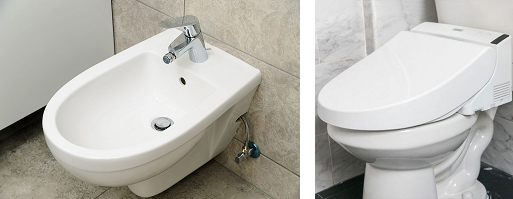Today's new-to-me word isn't entirely new to me, but I did learn something interesting about it. Does that count?
The word is washlet. What's a washlet? Well, it's a relative of the bidet (bee-DAY), which is a standalone fixture in a bathroom that you use to wash your nether parts after doing your business. Bidets are surprisingly rare in the US, which is one reason we had the Great Toilet Paper Panic about a month ago.[1]
Bidets can also be hard to fit or retrofit into a bathroom, because they require plumbing, not to mention enough room for another floor-mounted fixture. Enter the washlet. Or technically the Washlet, because the name Washlet is a trademark of Toto, a Japanese toilet company. The Washlet is a device that you can fit onto an existing toilet, replacing the seat, that has bidet-type functionality: wash, dry, etc. Unlike bidets, washlets can be pretty easy to retrofit, because they can use the plumbing that's already in use for your toilet.
A picture will help:

Traditional bidet on the left; Washlet on the right
Why am I yammering on about this? Because I think the word washlet is being genericized to refer to any washing-type device that fits onto a toilet. You won't see most manufacturers use the word—they're careful to use terms like bidet seat or spa because, as noted, Washlet is a trademark. But some do: example, example, example. And ordinary speakers have no compunctions about brand names ("Let me google that," "Do you have a kleenex?"). This became clear to me when I was listening to a podcast where the topic came up, and where one of the hosts explicitly said that a washlet is "the technical term for toilet seats that have got the stuff built into them." There you go.
This duty having been discharged, let me turn my attention to origins. Where does the word sugar come from? What about candy? Interestingly, from the same place.
Sugar cultivation started in India, so it's not surprising the sugar derives ultimately from a Sanskrit word sharkara that referred to grit or gravel or pebbles. From there it moved to Persian (shakar) and Arabic (sukhar) and then spread into the Mediterranean and Europe. Something I hadn't realized is that saccharine is basically the same word, this time from Greek.
 A slight mystery is how English ended up with a -g- in the middle of the word. We have a few examples in English like it (flagon from French flacon), and there was a late Latin word zugurum. But nothing certain. It's also not 100% clear why we pronounce the word sugar with an sh sound, but the theory is that the u used to be long and the word underwent a process that also gave us sure.
A slight mystery is how English ended up with a -g- in the middle of the word. We have a few examples in English like it (flagon from French flacon), and there was a late Latin word zugurum. But nothing certain. It's also not 100% clear why we pronounce the word sugar with an sh sound, but the theory is that the u used to be long and the word underwent a process that also gave us sure.
And then there's candy: also from Sanskrit (khanda), which meant "piece of sugar." The word moved along the same trade routes that sugar did—Persian, Arabic, Romance languages, us. A fun fact is that the term was originally sugar candy and referred specifically to the crystals (compare rock candy). In medieval times it came to refer to sugar processed during cooking. I guess I also mostly knew that it's primarily Americans who use candy as a general term for confections made of sugar; the Brits use sweets.
More Useful Facts for your indoor life! You're welcome. :)
Like this? Read all the Friday words.